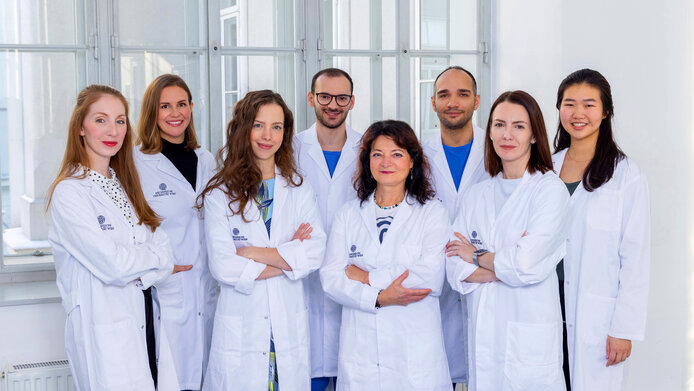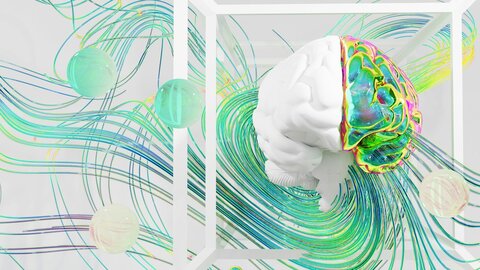Deciphering the molecular signature of long-Covid

The long-term consequences of Covid-19 can be so serious that those affected can no longer live like they used to. “Some people are unable to work. Even simple activities such as housework or a short bike ride are so exhausting that they just drop into bed and are hardly able to get up again,” reports Mariann Gyöngyösi, a cardiologist at the Medical University of Vienna and leader of the Long-Covid Study at the Cardiology Outpatient Clinic.
“The biggest problem is that we are still unable to reliably diagnose long Covid. There are no biomarkers, no classical imaging techniques or other diagnostic tests that are specific to long-Covid given the great diversity of symptoms,” explains Gyöngyösi. It is still unclear why some people develop long-Covid and others do not. In the context of a project funded by the Austrian Science Fund FWF, the cardiologist is investigating whether there are biomarkers that are characteristic of the disease. For this purpose she takes a new analytical approach to the data from the outpatient clinic. “We are delving deep into molecular biology, because conventional lab tests do not help us in terms of diagnosis or therapies.”
30 to 40 percent remain without clinical findings
In the majority of patients, tangible changes can be identified that can be treated symptomatically or with a therapy in keeping with current medical guidelines. In a publication from the research project, Gyöngyösi describes a therapeutic regime that can be used to specifically treat persistent myocarditis and improve heart function (see video). “But in around 30 to 40 percent of patients, we find no clinically detectable abnormalities. In these cases we have to dig deeper.”
About the project
Long COVID Syndrome presents with numerous symptoms and can affect multiple organ systems. Despite intensive research, there is currently insufficient data to explain the origin of the disease. In a clinical study, a research group in Vienna is investigating potential biomarkers in patients’ blood. The results are being collected in a database and analyzed.
For this reason, Gyöngyösi’s team is currently looking for molecular biological markers, such as certain microRNAs, so-called cell-free DNA in body fluids or protein signatures. “We analyzed the proteins in the blood of 100 patients, for instance, and found that some were boosted and others declined. These proteins can act as biomarkers pointing to an immune system that is out of kilter,” says the cardiologist. The results are currently being verified in a larger patient cohort, but the initial findings have already been honored with an award from the American Society of Cardiology.
Diagnostic approaches are now to be interlinked
“Long-Covid is a multi-organ disease, which is why it is difficult to find a single biomarker that is specific for all organs or all symptoms. What we need instead is network medicine, i.e. we need to look at the entire system of many different, small alterations,” says Gyöngyösi. This is the approach she now wants to take so as to raise the research project to a new level. To this end, the clinician is collaborating with experts from the fields of bioinformatics and molecular biology with a view to combining diagnostic data. This includes techniques such as magnetic resonance imaging, traditional clinical examinations and new molecular biology approaches.
“It is essential that we combine these levels – imaging, clinical data and molecular biology. That may help us find a set of parameters that enables us to determine whether a person has long-Covid and to estimate the course of the disease. This is important from a diagnostic point of view, but also because it can inform research for a therapy,” Gyöngyösi notes.
No specific therapy to date
Over 600 patients have already been registered in the long-Covid study outpatient clinic. Their data provide important insights, with one publication from the project showing that a Covid-19 vaccination reduces the severity of multi-organ symptoms in long-Covid. The reactivation of other viruses dormant in the body is also likely to play a role – a study from Gyöngyösi's team showed that vaccination also helps in this respect.
Apart from this preventive effect, the therapy has so far remained purely symptomatic and correspondingly complex: “There are over 200 documented symptoms for long-Covid. One patient may have a problem with blood clotting, another has residual abnormalities in the lungs, a third patient has muscle pain and a fourth has a psychosomatic illness,” Gyöngyösi notes, reporting on her experiences from the outpatient clinic. The most common symptoms affect the nervous system, followed by the cardiovascular system and the lungs. Around 60 to 70 percent of those affected are women.
Exercise intolerance, for example in the form of myalgic encephalomyelitis/chronic fatigue syndrome (ME/CFS), is typical of long-Covid. Circulatory problems are also common. “In general, we speak of long-Covid when patients still experience symptoms three months after an infection or new complaints have developed,” explains the doctor.
Knowledge gained since the pandemic
When Gyöngyösi started the research project in mid-2022, over 100 million people worldwide were infected with the Covid-19 virus. “Back then, there were only a handful of publications on cardiological treatment in the databases. Three years later, there are over 20,000 specialist articles and we know much better how we can alleviate patients' symptoms,” says Gyöngyösi. In addition, more and more research results indicate that the symptoms do not occur only as a result of a Covid-19 infection, but generally after viral infections, for example influenza viruses. “We call this 'post-viral syndrome'. With long-Covid, the post-viral symptoms last longer – years, in some cases – and are more severe than with influenza,” explains Gyöngyösi.
In spite of all this, the doctor is optimistic: “I see good chances of recovery, especially in patients where we can't pin down any objective findings. In many cases, we see that they suddenly feel better again after two or three years. We have to give those affected this hope.”
Personal details
Cardiologist Mariann Pavone-Gyöngyösi studied at the University of Szeged in Hungary before taking up a position at the Medical University of Vienna, where she has been a professor at the Department of Cardiology since 2017. Her research focuses on the fundamentals of cardiovascular diseases and developing therapies for heart regeneration. The project “Predictive biomarkers of post-Covid syndrome” receives roughly EUR 400,000 in funding from the Austrian Science Fund FWF and is set to run until 2026.
Selected Publications
Han E., Müller-Zlabinger K., Hasimbegovic E. et al.: Circulating Autoantibodies Against Vasoactive Biomarkers Related to Orthostatic Intolerance in Long Covid Patients Compared to No-Long-COVID Populations: A Case-Control Study, in: Biomolecules 2025
Hamzaraj K., Han E., Hasimbegovic E. et al.: Impact of Circulating Anti-Spike Protein Antibody Levels on Multi-Organ Long Covid Symptoms, in: Vaccines (Basel) 2024
Gyöngyösi M., Alcaide P., Asselbergs FW. et al.: Long COVID and the cardiovascular system-elucidating causes and cellular mechanisms in order to develop targeted diagnostic and therapeutic strategies: a joint Scientific Statement of the ESC Working Groups on Cellular Biology of the Heart and Myocardial and Pericardial Diseases; in: Cardiovascular Research 2023
Gyöngyösi M., Lukovic D., Mester-Tonczar J. et al.: Effect of monovalent COVID-19 vaccines on viral interference between SARS-CoV-2 and several DNA viruses in patients with long-COVID syndrome, in: NPJ Vaccines 2023






